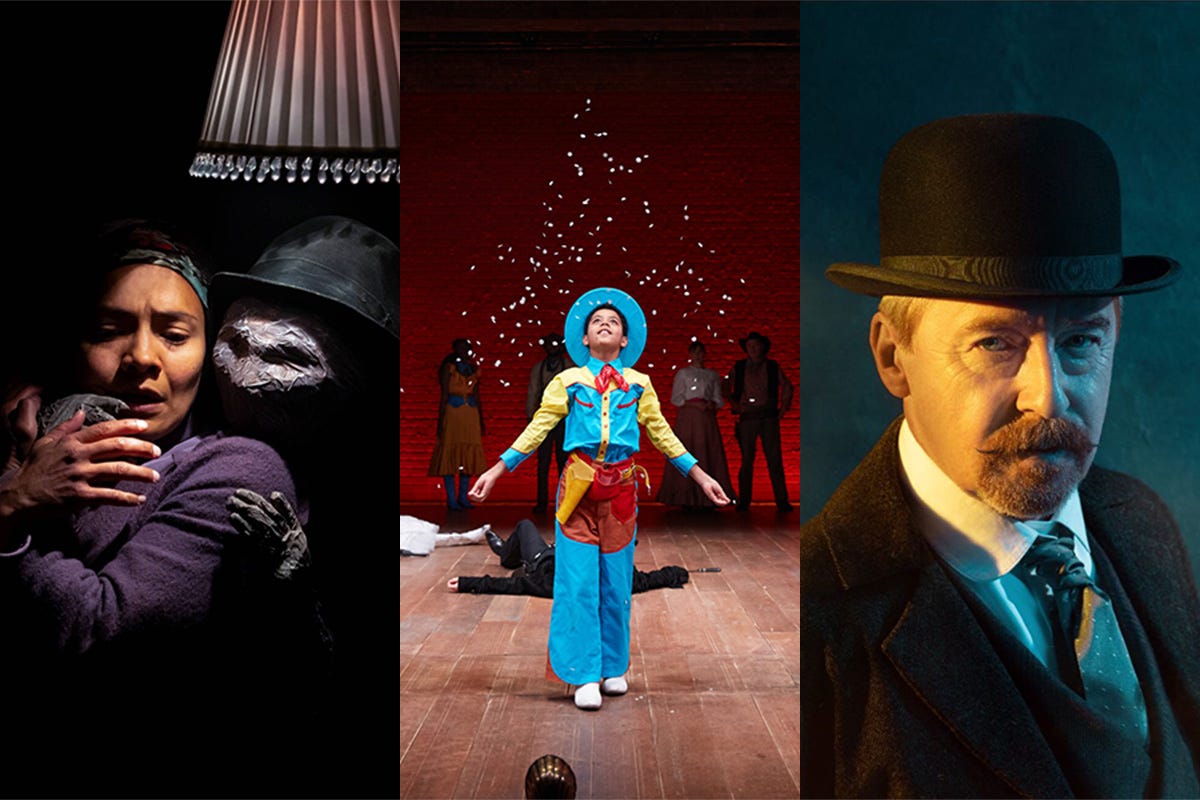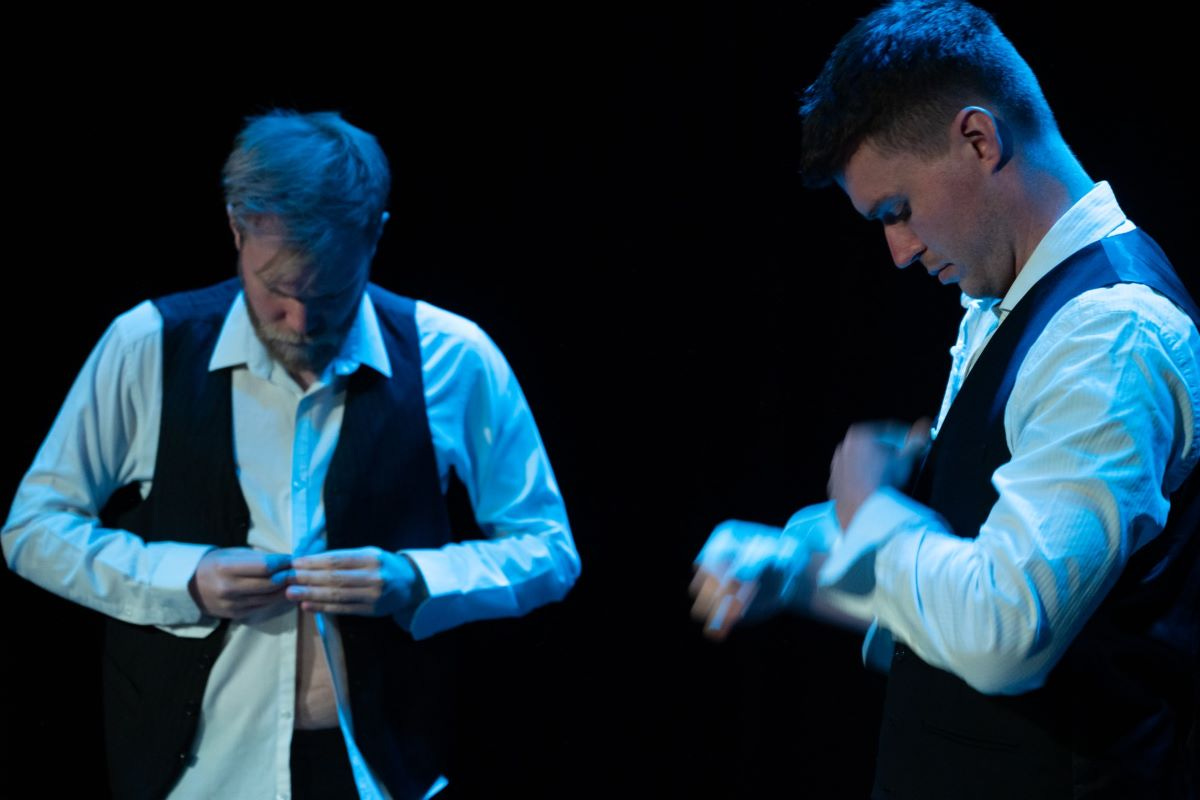Some hopes for the theatre industry in 2024, touring company Strange Futures, and three shows to see...
Plus: don't forget to sign up as a paid supporter of The Crush Bar to receive Shouts And Murmurs, a new weekly email containing lots of exciting stuff.
Hello, and welcome to The Crush Bar, a newsletter about theatre written by Fergus Morgan.
This is the first issue of 2024 and it features a bit on what I would - and would not - like to see happen in the theatre world this year, an interview with theatre company Strange Futures ahead of their remarkable show The Endling running at Camden People’s Theatre later this month, and three show recommendations - two in London, and one in Scotland.
Before all that, though, I wanted to remind you about Shouts And Murmurs, a new email for paid supporters of The Crush Bar, the first issue of which is going to be sent out on Tuesday. It is going to be more informal than regular editions of The Crush Bar, and it will feature a range of fun stuff, from round-ups of the best theatre writing elsewhere to theatre-themed puzzles.
If you want to receive Shouts And Murmurs, then sign up as a paid supporter of The Crush Bar for £5/month or £50/year using the button below. If you don’t feel like paying but still feel like getting the newsletter, then just reply to this email saying so, and I can make that happen.
There are a couple more things you can do to support this newsletter: you can share it with anyone you think might enjoy it and encourage them to subscribe, and you can use it for promotional purposes. There is more info about that here. Right, on with the issue…
Some hopes for the theatre industry in 2024
1. A new government
It is hard to overstate the damage done to the arts industry over thirteen years of Tory rule in Westminster. The sector has been strategically starved of state funding ever since George Osborne’s unnecessary austerity was introduced in 2010. The devastating effect of this was further compounded by Brexit and the needless limitations that placed on the industry, and by Covid.
Organisations have disappeared. Those that have survived have done so at great cost, and many still fear for their immediate future. The artists and workers they support have been left in a precarious position, in which being overworked and underpaid is the norm and the possibility of building a sustainable career seems impossible. This has had a knock-on effect on pretty much everything, from the adventurousness of the work seen on our stages, to the background of those that make it.
On top of that, the arts have been weaponised in the Tories’ so-called “culture wars” as they seek to kick up a cloud of septic dust that will mask their failures and shift the playing field of this year’s general election onto cultural territory, where they can cling onto their core voters. The result is an arts industry that is tired, scared, and toxic, filled with good people doing their best in bad situations.
Needless to say, the biggest help here would be a crushing win for Keir Starmer, a Labour government that genuinely recognised the social, spiritual and economic value of the arts, and a radical, well-funded plan to help them survive and thrive once more. The first half of that sentence seems inevitable. The latter I am less confident about. Shadow culture minister Thangam Debbonaire was actually a professional classical cellist, so surely knows what the arts need. Let’s hope her boss does, too.
2. Less IP, more originality
One of the consequences of all of the awful stuff that has happened to the arts since 2010 – the Tories, Brexit, and Covid – is that theatres and producers have grown increasingly risk-averse. They have been forced to stick to recognisable titles and big names - and they have become alarmingly obsessed with adapting films and TV series for the stage at the expense of original work.
Everywhere you look, there is a movie-turned-musical or a TV-series-turned-play. The West End is the worst – every week brings a new atrocity, it seems – but subsidised theatres have played their part, too. Of course, I get it. Screen-to-stage adaptations shift tickets. And sure, sometimes they are interesting, and sometimes they get a new audience in the door. Most of the time, though, they suck. And, worse still, they train audiences to stick to what they know, rather than try something new.
Will 2024 be any different? Probably not. There are already adaptations of Mean Girls, The Devil Wears Prada, Dr Strangelove, and Minority Report on the way, and more will doubtless follow. Let’s just hope that some will not be shit. Let’s pray for more Cold Wars and less Time Traveller’s Wives.
Where there is reason to be cheerful, though, is in the changing of the guard in some of the industry’s biggest jobs: Indhu Rubasingham at the National Theatre, Tamara Harvey and Daniel Evans at the RSC, David Byrne at the Royal Court, Bec Martin at the New Diorama Theatre, Jemima Levick at the Tron Theatre, Tim Sheader at the Donmar Warehouse, and more. These are all exciting appointments, and I look forward to the hurricane of fresh air they will all bring to their institutions.
3. A resurgent critical discourse, and lots more.
There is lots more I would like to see happen in 2024. I would like to see drama and the arts regain their place in the curriculum once more: that one should be near the top of Debbonaire’s to-do list, should she reach government. I would like to see some sort of crackdown on exploitative ticket-prices – like the astonishing £300 for Plaza Suite, more on which next week – but I have no idea what that would look like. I would like to see more attention paid to the extraordinary work that happens outside the M25.
I would also like to see a resurgence in theatre criticism and the conversation surrounding it. Ten years ago, when I first started writing about theatre, there was a vibrant discourse that took place on Twitter, on the Guardian’s theatre blog, on Exeunt, and elsewhere. Today, Twitter has been ruined, the Guardian’s theatre blog and Exeunt are defunct, and that discourse is nowhere to be found.
On that front, I do have hope. Here on Substack, there are some exciting things happening. Natasha Tripney’s newsletter Café Europa analyses European theatre. Lauren Halvorsen’s Nothing For The Group entertainingly rounds up theatrical activity across the pond, as does Peter Marks and Elisabeth Vincentelli’s Substack podcast. Chris McCormack’s Feeling Good offers insight on Irish work. Increasingly, there are some terrific theatre writers finding a home on Substack. Plus me.
What else do I hope for in 2024? Less doom and more joy. Less laziness and more rigour. Less self-absorption and more curiosity. Less cruelty and more compassion. Less gatekeeping and more openness. Less nepotism and more transparency. Less trend-chasing and more trend-setting. That is probably enough to be going on with.
An endling is the last individual of a species, the final full-stop in its journey to extinction.
There is a depressingly long list of them: Martha, the last passenger pigeon, died in Cincinnati in 1914; Benjamin, the last Tasmanian tiger, died in Hobart in 1936; Toughie, the last Rabbs’ fringe-limbed treefrog, died in Atlanta in 2016. Their ghosts haunt touring company Strange Futures’ show The Endling, which, fittingly, makes its own final appearance at Camden People’s Theatre later this month.
The show, which has toured since 2021, was devised by Strange Futures’ three co-directors Matt Simmonds, Will Moore and Jane George, and sees Simmonds and Moore explore extinction from scientific, social and philosophical perspectives through an imaginative and idiosyncratic mix of physical theatre, clowning and sketch comedy. I saw it at the Edinburgh Fringe in 2022, and called it “surreal, silly and sombre, all at the same time” in my four-star review for The Stage.
“We were inspired by Mechanimal’s show Vigil, which is about species extinction, and which we saw in Edinburgh in 2019,” says George. “We went back to our accommodation and wrote responses to it. We played around with some ideas for a while, then Julian Spooner of Rhum + Clay helped us make a bit more sense of it. He saw what we were doing and helped us hone it into a show.”
“All of our work is generated through play,” continues Moore. “We bring lots of different things into a rehearsal room, go down lots of different tangents, then try to knit them together. One interesting thing that emerged when we were making The Endling was this social principle of human exceptionalism, this Anthropocentrism, that perpetuates throughout the history of our relationship with the natural world and still does a lot of damage. We wanted our audience to understand that.”
“We are all neurodivergent in different ways, and our creative process can be scatty and inefficient,” adds Simmonds. “But I like to think it always ends up with something beautiful happening on stage.”
“Our creative process can be scatty and inefficient. But I like to think it always ends up with something beautiful…”
Strange Futures was born on Worcester University’s masters-level degree in touring theatre, where Simmonds, from Dudley, and Moore, from Hereford, were put together by course leader George for their final project. The result was 2019’s There’s Something Missing, a physical comedy about masculinity with dramaturgy by experimental duo Bertrand Lesca and Nasi Voutsas. “It seemed to work,” says George. “At first, I just supported them. Gradually, I’ve become part of the company.”
The company’s work is split into two strands, explains George. There are the professional touring shows – There’s Something Missing and The Endling – and there are participatory projects, which see Simmonds, Moore and George work with different communities in the West Midlands, where the company is based. “We do quite a wide range of stuff, but the environment and climate change is at the heart of it,” adds Simmonds. “We go down different avenues, but that is at the core.”
In The Last Restaurant, the company collaborated with Malvern school children to create a restaurant without food. In Slow Cooked Stories, the company arrives in a community, gathers stories from local residents, then tells them over a two-course dinner. New show The Tree Rings, which explores the history of environmental protest through the surreal relationship between a boy and a tree, began as a community cast project, and is being adapted into a professional show.
Another participatory project, a puppetry-and-projection-filled adaptation of Under Milk Wood called On The Bare Hill, will be performed in Malvern in May, while another new professional show exploring animal suicide and anthropomorphism and currently titled Fine Gorilla Man, is currently being developed.
“Right now, we get project funding to cover about nine months out of twelve, which is great,” says Simmonds. “Our next aim is to go for multi-year funding to run some larger projects. We look up to companies like Rhum + Clay and Gecko, who have managed to grow without diluting their work.”
The Endling is at Camden People’s Theatre on Wednesday 17 January and Thursday 18 January. For more information and tickets, click here.

Three shows to see next week
MimeLondon - various, until February 17
London International Mime Festival ended in 2023 after more than four decades of bringing a wild range of boundary breaking visual theatre to stages across the capital. MimeLondon is a successor of sorts. Curated by ex-LIMF directors Helen Lannaghan and Joseph Seeling, it features shows from France, Spain, the USA, and the UK in a variety of venues - Gecko’s Kin at the National Theatre, Ockham’s Razor’s Tess at Sadler’s Wells’ Peacock Theatre, and Ad Infinitum’s Last Rites at Shoreditch Town Hall all look great - plus several theatre workshops. Dive in via the button below.
Cowbois - Royal Court Theatre, until February 10
Charlie Josephine’s new play Cowbois premiered in Stratford-upon-Avon in October. Now, that Royal Shakespeare Company production transfers to Sloane Square for a month-long run. Co-directed by Josephine and Sean Holmes and starring Sophie Melville and Vinnie Heaven, the play is billed as “a rollicking queer Western like nothing you’ve ever seen before” and was nominated for two WhatsOnStage Awards for Best New Play and Best Costume Design. You can get tickets via the button below.
Jekyll and Hyde - Edinburgh Lyceum, until January 27
This one-man version of Robert Louis Stevenson’s gothic novella originally ran in Reading in 2022, and now returns to its spiritual home in the Scottish capital before visiting Perth and Dundee. Written by Gary McNair - who is everywhere right now - and performed by Forbes Masson, who recently returned to the Scottish stage for the first time in twenty years, it promises to be both creepy and comedic. You can read my interview with Masson in The Stage soon, and get tickets via the button below.
That’s all for this issue
That is it for this week. If you want to get in touch about anything raised in this issue - or anything at all, really - just reply to this newsletter or email me at fergusmorgan@hotmail.co.uk. Or you can find me on Twitter/X, where I am @FergusMorgan.
A quick reminder of the ways you can support The Crush Bar. You can share it. You can use it for promotional purposes. And you can become a paid supporter, which now means you get an extra weekly email, Shouts and Murmurs, every Tuesday. There are currently 2463 subscribers, 38 of whom are currently paid supporters. If you would like to join them, you can do so above.
Fergus




